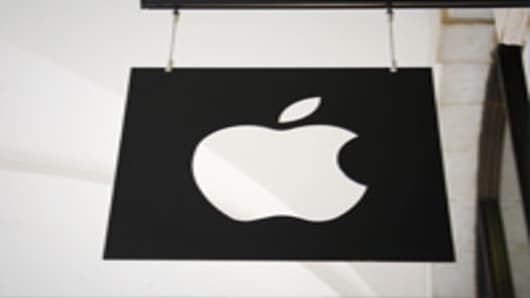“It’s one of the biggest companies in the US, it seems like it would be reasonable to have it in the Dow,” says Philip Silverman, managing partner at Kingsview Management in New York. “The Dow is not necessarily just industrial companies these days, it’s supposed to be a representation of the very large bluechip companies. Apple is the best company we’ve got.”
Moreover, the price-weighted manner in which the Dow is calculated would result in a big jump for the index, with ensuing enthusiasm also likely to drive Apple’s price higher.
“From a standpoint for Apple, it’s great for shareholders, it’s tremendous for the Dow 30, the ripple effects would be tremendous. So let’s bring it on,” says Todd Schoenberger, managing director at LandColt trading in Loews, Del. “This is long overdue. Apple should have been added years ago.”
The problem with getting Apple in the Dow, ironically, is its astronomic share price.
As the index stands now, IBM is the priciest stock at about $176.
Adding Apple would give the company more than double the weight of any other stock, making the bluechip index, in the words of one analyst, the “Dow Jones Industrial Apple.”
“AAPL is the largest company in the world based on market cap, but even it doesn’t deserve to have a weighting of nearly 2.5 times the next largest stock,” Bespoke Investment Group said in an analysis of Apple’s possible entrance to the Dow 30.
However, a stock split might to do the trick.
If the company did, say, a 3-for-1 split, that would cut the price tag to the $140 range, which would be less than IBM.
For the record, Dow Jones Indexes spokesman Rich Silverman said the company “does not comment on what stocks are being considered for inclusion or being considered for removal.”
That decision is made by a three-member panel consisting of Wall Street Journal Managing Editor Robert Thomson as well as Julie Winkler, CME Group’s managing director of research and product development, and John Prestbo, Dow Jones Indexes’ editor and executive director.
Another of the big questions pondered is what company would be eliminated from the index should Apple be added.
Some of the chatter centered on the weakened financials—Bank of America , for instance, is trading around $7 a share despite being the biggest bank in the US. The still-powerful JPMorgan Chase , despite losing more than 16 percent over the past year, would be an unlikely candidate for exclusion.
Bespoke’s analysis suggests that Kraft could be the company to go.
In that case, Apple would account for 22 percent of the index’s weighting, while IBM’s share would slip to 9.2 percent, presenting a distorted view of the nation’s industrial climate every time Apple shares had a hiccup.
Then there’s the disadvantage to Apple.
After all, tech stocks hardly have a glittering history when added to the Dow.
Intel and Microsoft made the move in 1999 and saw respective price declines of 41 and 34 percent since then, and Cisco joined the bluechips in 2009 and fell 17 percent.
“When they put these tech stocks in the Dow it’s the kiss of death,” says Dave Rovelli, managing director of US equity trading for Cannacord Adams. “Every time a teach stock goes into the Dow it goes down.”
Questions? Comments? Email us at NetNet@cnbc.com
Follow Jeff @ twitter.com/JeffCoxCNBCcom
Follow NetNet on Twitter @ twitter.com/CNBCnetnet
Facebook us @ www.facebook.com/NetNetCNBC



